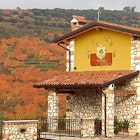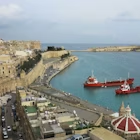
Sicily's best hikes: ancient ruins, volcanic craters and beautiful beaches

Take a guided hike up Stromboli Volcano โ you may see minor eruptions as you go. Marco Simoni / Getty Images
With its volcanic islands, rugged shorelines and brilliant blue-green waters, Sicily offers some of the most dramatic coastal landscapes on earth, along with a slew of gorgeous trails.
Whether youโre looking for a single-day hike or a whole vacationโs worth of walking, youโll find it here. To avoid heat, crowds and high prices, come in spring (AprilโJune) or early autumn (SeptemberโOctober).
Stromboli Volcano
Best hike for volcanic action
Start/end: Stromboli town, 2.5 miles (4km) round trip, 2โ3 hours, moderate
For sheer excitement, nothing compares to in the Aeolian Islands. Sicilyโs showiest volcanic island has been lighting up the Mediterranean for millennia, spewing out showers of red-hot rock with remarkable regularity since the age of Odysseus.
In fact, Stromboli erupted again in 2019, which changed the way people can hike the slopes. Instead of climbing to the 3032ft (924m) summit, hikes now stop at an observation point at about 400m. Still, even from this level the views are grand and feature a close view of the Sciara del Fuoco, a jet-black lava scar that runs down Stromboliโs northern flank. Note that guides are required for this hike.
The trail (initially a switchback road) starts in Piscitaฬ, 1.25 miles (2km) west of Stromboliโs port. Hikes to the current endpoint only take about an hour but are still very steep and not for the timid. Be prepared โ the trail narrows and gets steeper as you climb.
Youโll likely see minor eruptions occur every 20 minutes or so during your time on the path. Thereโs a loud belly-roar as gases force hot magma into the air. After particularly strong eruptions, you can watch as red-hot rocks tumble down the seemingly endless slope, creating visible splashes as they plop into the sea. For best viewing, come on a still night, when the livid red Sciara and exploding cone are dramatically visible.
Monte Fossa delle Felci
Best hike for sweeping views
Start/end: Valdichiesa, 2.5 miles (4km) round trip, 3 hours, moderateโhard
The ancient Greeks dubbed this island Didyme (the twins) for its verdant pair of dormant volcanoes. These days remains the Aeolian Islandsโ greenest island, dotted with wineries that produce the regionโs renowned Malvasia wine. For sweeping views of the vineyards and the surrounding seascape, climb Salinaโs highest peak, Monte Fossa delle Felci (3156ft/962m).
The trail starts at Santuario della Madonna del Terzito, an imposing 19th-century church at Valdichiesa, in the valley separating the islandโs two volcanoes. It switchbacks steeply up the mountainside, climbing through pine and chestnut woodlands and fields of ferns, all the way to the top. Along the way, youโll see plenty of colorful flora, including wild violets and asparagus.
The last 328ft (100m) to the summit is tough. Once there youโre rewarded with jaw-dropping views of Salinaโs shapely second cone, 2821ft (860m) Monte Porri, backed to the west by the distant volcanic islands of and Alicudi. From the southeast ridge, you can look down over the Lingua salt lagoon and over to Lipari and Vulcano.
Pianoconte to Quattropani, Lipari
Best hike for coastal scenery
Start: Pianoconte, end: Quattropani, 5 miles (8km), 3โ4 hours, moderateโhard
Fabled since ancient times for its rich obsidian deposits, Lipari also boasts some of the stupendous coastal scenery in the Aeolian Islands. This classic hike starts from Pianoconteโs school (3 miles/5km west of Lipari Town), descending toward the sea along a paved road, which eventually narrows to a trail. Leveling out along the coastal bluffs, a relatively flat section skirts Lipariโs western shoreline, affording fabulous views of Salina, Vulcano, Filicudi, and Alicudi, before climbing steeply to the town of Quattropani.
As you descend from Pianoconte, youโll pass the old Roman baths of San Calogero, famous in antiquity for the thermal spring that flowed at a constant temperature of 140ยฐF (60ยฐC). Climbing back to Quattropani, youโll also pass the Old Kaolin Mine, where the hillside is still visibly scarred. The trail can just as easily be hiked in the opposite direction, starting just south of town. Either way, the strenuous climbs and steep descents are rewarded with spectacular coastal scenery and dramatic vistas of flower-covered slopes cascading to the cobalt sea below.
Both ends of the trail can be reached by local bus โ on the way there, ask the driver to let you off at the trailhead; returning, look for the official bus stop in either Pianoconte or Quattropani.

Fossa di Vulcano
Best hike for steaming craters
Start/end: Vulcano port, 2.5 miles (4km) round trip, 2โ3 hours, moderate
Volcano hikes donโt get much more satisfying than the gradual climb up 1283ft (391m)Fossa di Vulcano, the smoldering grayish-orange peak that dominates the island of in the Aeolian Islands. Belching out a steady stream of noxious sulfurous fumes, the crater was mythologized by the ancient Romans as Vulcanโs forge.
Start early if possible and bring a hat, sunscreen and water. Follow the signs south along Strada Provinciale, then turn left onto the zigzag gravel track that leads to the summit. Itโs a 30- to 60-minute climb to the lowest point of the volcanoโs rim (951ft/290m), where youโll be rewarded with fine views of the steaming crater encrusted with red and yellow crystals.
Itโs well worth lingering up top and climbing another 15 minutes around to the southern rim for stunning views of the distant silhouettes of the remaining five Aeolian Islands aligned symmetrically on the horizon with the gaping crater in the foreground. The truly ambitious can descend steeply to the crater floor (but beware of hot steam vents and the accompanying toxic fumes).

Capo Milazzo
Best hike for families
Start/end: Chiesa di San Antonio, 1.9 miles (3km) round trip, 1 hour, easy
You couldnโt ask for a more scenic hike than this easy, family-friendly loop around the hook-shapedCapo Milazzo peninsula north of. The trail initially passes through a level landscape of olive groves, cactus, and stone walls before beginning a steady descent towards the surging sea.
The views get truly dreamy near the peninsulaโs northern tip, where youโll find a lighthouse. Short trails lead to the Piscina di Venere, an idyllic rock-fringed natural pool thatโs perfect for a swim. Loop back along the peninsulaโs western shore, stopping en route to visit the cactus-covered ruins of the 13th-centurySantuario Rupestre di San Antonio da Padova.
Riserva Naturale dello Zingaro
Best hike for reveling in nature
Start/end: Scopello, 8.7 miles (14km) round trip, 5 hours, moderate
Spanning a sinuous series of coves and steep headlands one hour west of Palermo, theRiserva Naturale dello Zingaro was established as Sicilyโs first nature reserve in 1981, after local protests canceled construction of a controversial highway that would have bisected this spectacular shoreline. The result: one of Sicilyโs best walking locales, with the would-be highway converted into a 4.4-mile-long (7km) trail snaking between bluffs and beaches.
Some 40 bird species (including rare Bonelli eagles) and 700 species of flora can be found here, along with a visitors center and several small museums that celebrate the areaโs traditional farming and tuna fishing economy. The trail is most easily hiked as a simple out-and-back from the parkโs southern entrance 1.25 miles (2km) north of the pretty hamlet of Scopello.
Maps available at the visitors center show several optional trails as well as paths down to the pretty beaches.
La Rocca
Best hike for historic ruins
Start/end: Piazza Garibaldi, 1.9 miles (3km) round trip, 1.5 hours, moderate
Towering high above's sandy beach and Arab-Norman cathedral, the craggy outcrop ofLa Rocca makes an exhilarating short day hike. To reach the vertiginous 886ft (270m) summit, follow signs for Tempio di Diana, taking Vicolo Saraceni off Corso Ruggero or Via Giuseppe Fiore off Piazza Garibaldi. The 30- to 45-minute route climbs the Salita Saraceni, a winding ancient stone staircase. Pass through three tiers of city walls and enjoy pretty views of the cathedralโs honey-colored towers before emerging onto rock-strewn upland slopes with spectacular coastal views.
The windswept summit appears a suitable home for the race of giants that are said to have been Sicily's first inhabitants. Crowning the hilltop is a ruined 11th-century Norman castle superimposed on a 9th-century Arab citadel, surrounded by sweeping 360-degree panoramas of the Madonie Mountains and the Tyrrhenian. The ruined 4th-century-BCE Tempio di Diana provides a quiet and shady respite for tired hikers.

Riserva Naturale Oasi Faunistica di Vendicari
Best hike for bird-watching
Start: main entrance, Vendicari reserve; end: Spiaggia Calamosche, 3.1 miles (5km), 1.5 hours, easy
One of Sicilyโs easiest and most rewarding coastal walks runs through this birdwatcherโs paradise just south of Syracuse. From the ฐ๙ฑ๐ฒ๕ฑ๐ฐ๙ฑนฑ๐โs main entrance, the trail follows raised boardwalks through coastal marshes filled at various times with flamingos, cranes, storks, ospreys, and dozens of other migratory bird species.
Nearing the sea, youโll come upon the photogenic remains of a historic 18th-century tuna-processing plant and a 15th-century Sveva defensive tower designed to repel attacks by pirates. Continue north along the shoreline to reach Spiaggia Calamosche, a pretty strip of sand lapped by turquoise waters between two jutting headlands. The swimming here is excellent.
Castello di Punta Troia, Marettimo
Best hike for castle lovers
Start/end: Marettimo town, 3.1 miles (5km) round trip, 2.5 hours, moderate
An hour west of Trapani, the green-hued island of Marettimo in the Egadi Islands is an attractive off-the-beaten-track hiking destination. Hydrofoils dock at the islandโs main village, a labyrinth of whitewashed houses surrounded by iridescent turquoise and ultramarine waters. From the port, a network of beautifully maintained, well-marked trails fan out around the island.
Especially scenic is the trail winding north along high bluffs to the dramatically perched Castello di Punta Troia, a 12th-century Norman castle built atop an earlier Saracen watchtower on a lonely promontory at Marettimoโs northeastern tip. Not far from here, in 241 BCE, the Romans and Carthaginians once fought the decisive battle of the First Punic War; these days itโs about as peaceful a spot as you could wish for.
You might also like:
15 things you cannot miss on your next trip to Sicily
The best free things to do in Sicily: from stunning churches to sumptuous art
Why Sicily is a year-round destination
Explore related stories




 ActivitiesThe best free things to do in Sicily: from stunning churches to sumptuous art
ActivitiesThe best free things to do in Sicily: from stunning churches to sumptuous artNov 18, 2021 โข 6 min read
 BeachesSeven islands, seven adventures: Sicilyโs idyllic Aeolian archipelago
BeachesSeven islands, seven adventures: Sicilyโs idyllic Aeolian archipelagoAug 29, 2017 โข 5 min read




